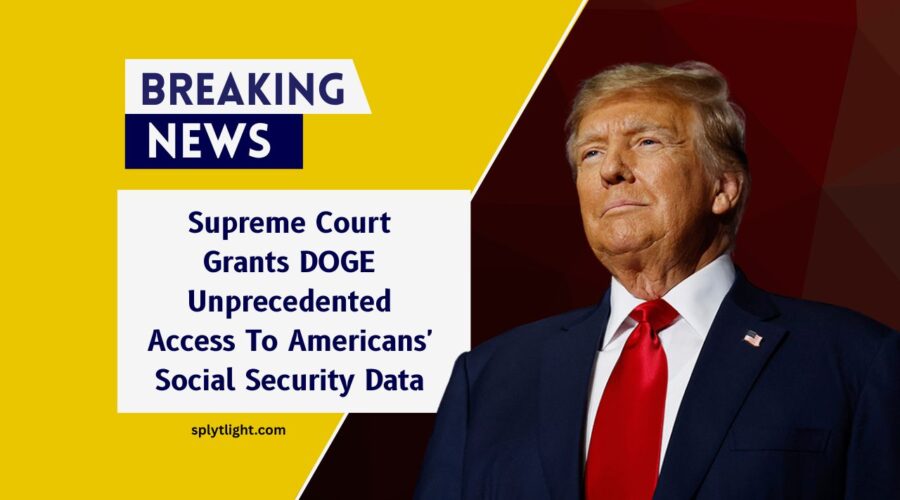Supreme Court Grants DOGE Unprecedented Access To Americans’ Social Security Data
On June 6, 2025, the U.S. Supreme Court issued a pivotal ruling allowing the Department of Government Efficiency (DOGE)—a Trump administration initiative—to access the Social Security Administration’s (SSA) sensitive databases.
This decision overturns previous restrictions and has ignited a national debate over data privacy, government overreach, and transparency.
What Is DOGE?
The Department of Government Efficiency (DOGE) was established by Executive Order 14158 on January 20, 2025, during President Donald Trump’s second term.
Initially led by Elon Musk, DOGE’s mission is to modernize federal technology, eliminate waste, and reduce government spending.
Despite Musk stepping down in May 2025, Department of Government Efficiency continues to operate under the Trump administration’s directives .
Supreme Court’s Decision
The Supreme Court’s 6-3 ruling, divided along ideological lines, permits Department of Government Efficiency to access SSA records containing personally identifiable information (PII), including:
- Social Security numbers
- Medical and mental health records
- Financial data
- Family court information
Dissenting Opinions
The court’s liberal justices—Ketanji Brown Jackson, Sonia Sotomayor, and Elena Kagan—expressed strong opposition.
Justice Jackson criticized the majority for granting “unfettered data access” without ensuring compliance with existing privacy safeguards, highlighting the “grave privacy risks” posed to millions of Americans .
Background of the Legal Battle
Initial Restrictions
In April 2025, U.S. District Judge Ellen Hollander imposed strict limitations on DOGE’s access to SSA data, citing potential violations of the Privacy Act. The order allowed only anonymized data access for trained and background-checked staff .
Administration’s Argument
The Trump administration contended that these restrictions hindered DOGE’s ability to identify and address fraud within the SSA. They argued that full access was essential for Department of Government Efficiency to fulfill its mandate of improving government efficiency .
Concerns Over Data Privacy
Potential Risks
Critics warn that DOGE’s access to sensitive data could lead to:
- Unauthorized surveillance
- Misuse of personal information
- Erosion of public trust in government institutions
Labor unions and advocacy groups have filed lawsuits, asserting that Department of Government Efficiency actions violate the Privacy Act of 1974 and other federal laws .
Calls for Transparency
Organizations like Citizens for Responsibility and Ethics in Washington (CREW) have demanded that DOGE disclose its operations and data handling practices. However, the Supreme Court has temporarily blocked such transparency measures, further fueling concerns .
Implications for Americans
The SSA maintains records on virtually every U.S. citizen, encompassing:
- Employment history
- Income details
- Medical records
- Family information
DOGE’s access to this data raises questions about:
- Data security
- Potential misuse for political or personal gain
- Impact on individuals’ privacy rights
Summary
| Aspect | Details |
|---|---|
| Date of Ruling | June 6, 2025 |
| Supreme Court Vote | 6-3 in favor of DOGE’s access |
| Data Accessed | Social Security numbers, medical records, financial data, etc. |
| Primary Concerns | Privacy violations, lack of transparency, potential misuse of data |
| Legal Basis for Access | Executive Order 14158; challenged under the Privacy Act of 1974 |
| Key Opponents | Labor unions, advocacy groups, liberal justices |
| Current Status | DOGE granted access; legal challenges ongoing |
The Supreme Court’s decision to allow Department of Government Efficiency access to SSA’s sensitive data marks a significant moment in the ongoing debate over privacy and government oversight.
As legal challenges continue, the implications of this ruling will likely resonate across various facets of American society.
FAQs
What is the Department of Government Efficiency (DOGE)?
DOGE is a Trump administration initiative aimed at streamlining federal operations, reducing waste, and modernizing technology. It was established in January 2025 and initially led by Elon Musk.
Why is DOGE’s access to SSA data controversial?
Critics argue that granting Department of Government Efficiency access to sensitive personal data without stringent oversight violates privacy laws and could lead to misuse of information.
What are the potential consequences of this ruling?
The decision may set a precedent for expanded executive access to personal data, raising concerns about privacy, data security, and the balance of power between government branches.


Leave a Reply